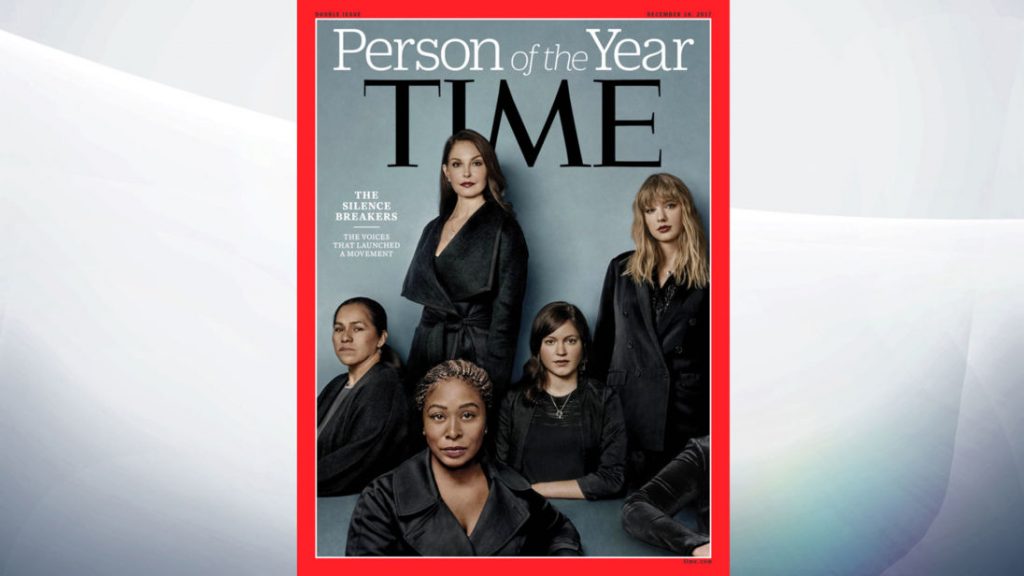Recently, Donald Trump’s claim that he turned down TIME’s opportunity to be Person of the Year again (though he called it Man of the Year) was disputed by the publication. I saw speculation that the person they would choose – the person who “most influenced the news during the past year, for better or for worse” – might be Kim Jong-Un.
In short, it seemed to be about powerful men. Yawn.
So, when TIME announced that its Person of the Year was the “silence breakers”, the “thousands of people across the world who have come forward with their experiences of sexual harassment and assault”, I was taken aback. In a good way. These were people who deserved to be honoured (though the title maintains that the award is not an “honouring” in any traditional way) and who had certainly caused the world’s media to change its direction and focus in the last few months.
These are the people who have led to a historic shift in public perception and awareness about the prevalence of sexual harassment, assault and abuse.
The change has been momentous, women have been believed, and abusers have faced consequences. Real consequences.
The other side of the coin
At the same time, the patriarchy grinds on with predictable monotony. Brock Turner, whose name became synonymous with paltry prison sentences for sexual abusers, is appealing his conviction. Turner, who was convicted of sexually assaulting an unconscious woman, says that he is the victim of prosecutorial misconduct because the prosecuting lawyer in his case repeatedly mentioned that he had raped the unconscious woman “behind a dumpster”.
Because that is what we all objected to. The location. Not his cruel assault, or the six-month sentence he was handed down (of which he served just three).
But he thinks the references to a dumpster “tainted” the jury, “though in reality Turner’s victim was found in an open space behind a three-sided trash enclosure and a basketball court—apparently an important distinction”.
In reality, the guy got off ridiculously lightly. Three months in prison for an act that could easily ruin a woman’s life is trifling, and I can only assume that he’s hoping that more of that white male luck will shine down on him as he appeals his conviction. I can’t imagine that he’d take this risk if it was possible for the appeal to lead to a review of his minimal punishment and send him back inside, but I’m pretending to myself that it might just happen. After all, Oscar Pistorius came out of prison then was sent back in. I know – different crime, different country – though we can but hope.
Silence breakers
Brock Turner’s victim was saved by passers-by seeing what he was doing and detaining Turner until police arrived. Crimes like his victimise women – the kind of women (i.e. every kind of woman) who have been coming forward and named by TIME as Person of the Year. Some women stay silent, while many break their silence. But referring to the women who, this year, have been so very brave as “silence breakers” sits a little uncomfortably with me.
Framing these particular women as breakers of silence suggests that that was all they did. But there has been a difference this year, a difference these last few months; since the Weinstein story broke, survivors have not just been breaking their silence… they have been heard.
Survivors, women in particular, have been breaking their silence for decades. Throughout my lifetime and before that began, women have spoken up against the abuse, harassment and assault they have suffered at the hands of men. Sometimes in a trickle, and sometimes in an overwhelming outpouring. Performances of the Vagina Monologues encouraged some women to come forward, consciousness-raising and support groups prompted others to speak their truth, rape crisis helplines have heard whispered and yelled personal stories, while anonymity on the web helped other people to tell their own abuse histories (represented on the TIME front cover as the faceless elbow on the right, who did not want to risk being named).
The problem is not that we have not been telling our stories for years and years and years. The problem was that nobody would listen, nobody would take it seriously, and nobody would act.
The shift in public consciousness and social awareness that allowed Weinstein, then his cronies, to be held to account by the media and the general public when Polanski, Depp and Assange were not, will need to be studied so that we can understand how to make people listen. How to make people care.
The problem was not that nobody broke their silence until this summer, it is that we were speaking into the void.

